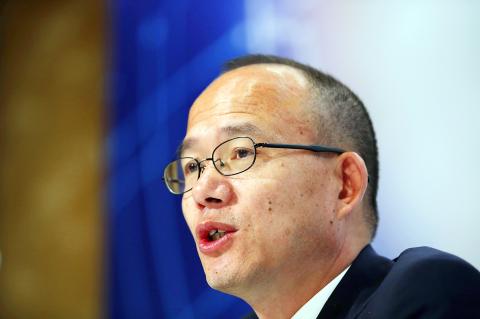Chinese conglomerate Fosun International Ltd (復星國際) zeroed in on its 18-month quest to buy French holiday resorts group Club Med SA on Friday when Italian businessman Andrea Bonomi refused to raise his latest offer.
Fosun looked assured to win what became the longest bidding war in Paris bourse history when Bonomi’s Global Resorts SAS announced on Friday it would not better the 24.60 euro (US$29.55) per share price the Chinese group proposed for Club Med on Dec. 19.
That offer — which topped Global Resort’s last bid of 24 euros per share — values Club Med at 939 million euros, which represented too much, in Bonomi’s view.

Photo: Bloomberg
“Having carefully analyzed the public offer for shares in Club Med SA, and, in particular the company’s valorization level, Global Resorts SAS has decided not to increase its bid, and consequentially intends to withdraw its offer,” financier Bonomi explained in a statement.
Bonomi’s decision clears the way for Fosun and its Chinese, Brazilian, Portuguese and French partners to move ahead with the acquisition of the famous French holiday group.
After weathering rough business seas over the past decade, Club Med improved its financial health by targeting higher-end clients, particularly among wealthier sections of emerging economies.
For example, according to Club Med figures released last month, 80 percent of the 25,000 new clients the group attracted in 2013 were Chinese or Brazilian.
Fosun — with whom Club Med has worked in expanding its activities in China — has said it wants to guide that continued expansion into new markets. However, Fosun has also stressed it wants to “continue to invest in France, Club Med’s leading market, to continue to win new parts of the market and outperform its competitors.”
Fosun’s looming bid victory does not come without some risks, however.
Despite its recently improving financial fortunes under its recalibrated business strategy, Club Med is reportedly set to reveal a net loss of 12 million euros for last year, on turnover of 1.38 billion euros.
Still, Fosun’s 24.60 euro per-share bid for Club Med — which owns 70 holiday resorts in 26 countries, and employs about 13,000 people — is considerably lower than the stock’s closing price on Friday of 25.09 euros.

SEMICONDUCTORS: The German laser and plasma generator company will expand its local services as its specialized offerings support Taiwan’s semiconductor industries Trumpf SE + Co KG, a global leader in supplying laser technology and plasma generators used in chip production, is expanding its investments in Taiwan in an effort to deeply integrate into the global semiconductor supply chain in the pursuit of growth. The company, headquartered in Ditzingen, Germany, has invested significantly in a newly inaugurated regional technical center for plasma generators in Taoyuan, its latest expansion in Taiwan after being engaged in various industries for more than 25 years. The center, the first of its kind Trumpf built outside Germany, aims to serve customers from Taiwan, Japan, Southeast Asia and South Korea,

Gasoline and diesel prices at domestic fuel stations are to fall NT$0.2 per liter this week, down for a second consecutive week, CPC Corp, Taiwan (台灣中油) and Formosa Petrochemical Corp (台塑石化) announced yesterday. Effective today, gasoline prices at CPC and Formosa stations are to drop to NT$26.4, NT$27.9 and NT$29.9 per liter for 92, 95 and 98-octane unleaded gasoline respectively, the companies said in separate statements. The price of premium diesel is to fall to NT$24.8 per liter at CPC stations and NT$24.6 at Formosa pumps, they said. The price adjustments came even as international crude oil prices rose last week, as traders

SIZE MATTERS: TSMC started phasing out 8-inch wafer production last year, while Samsung is more aggressively retiring 8-inch capacity, TrendForce said Chipmakers are expected to raise prices of 8-inch wafers by up to 20 percent this year on concern over supply constraints as major contract chipmakers Taiwan Semiconductor Manufacturing Co (TSMC, 台積電) and Samsung Electronics Co gradually retire less advanced wafer capacity, TrendForce Corp (集邦科技) said yesterday. It is the first significant across-the-board price hike since a global semiconductor correction in 2023, the Taipei-based market researcher said in a report. Global 8-inch wafer capacity slid 0.3 percent year-on-year last year, although 8-inch wafer prices still hovered at relatively stable levels throughout the year, TrendForce said. The downward trend is expected to continue this year,

POWERING UP: PSUs for AI servers made up about 50% of Delta’s total server PSU revenue during the first three quarters of last year, the company said Power supply and electronic components maker Delta Electronics Inc (台達電) reported record-high revenue of NT$161.61 billion (US$5.11 billion) for last quarter and said it remains positive about this quarter. Last quarter’s figure was up 7.6 percent from the previous quarter and 41.51 percent higher than a year earlier, and largely in line with Yuanta Securities Investment Consulting Co’s (元大投顧) forecast of NT$160 billion. Delta’s annual revenue last year rose 31.76 percent year-on-year to NT$554.89 billion, also a record high for the company. Its strong performance reflected continued demand for high-performance power solutions and advanced liquid-cooling products used in artificial intelligence (AI) data centers,